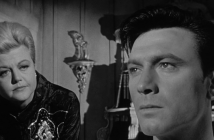
Editor’s Notes: The Danish Girl will be released on its respective format on March 1st.
The Danish Girl (Universal) opens with Einar Wegener (Eddie Redmayne) and wife Gerda (Alicia Vikander) as a happy couple in 1920s Copenhagen. He is a successful landscape artist, but Gerda, a portraitist, has not yet achieved success.
Since their sex life is fulfilling, Gerda thinks nothing of it when Einar agrees to dress as a woman and pose for her. These paintings prove to be her commercial breakthrough.
Gradually, however, Gerda begins to realize that Einar is changing from the husband she knew to a woman named Lili, a woman who has been inside him all along.

Based on a true story, the film focuses on the altering relationship between Einar and Gerda when Lili becomes more and more a strain on the marriage. Still, Gerda remains devoted to her husband and never stops loving him. Always understanding, supportive, and caring, she nonetheless suffers within from the loss of the man she married. The film is at its most harrowing when Gerda and Einar go to a series of doctors who attempt to diagnose Einar’s condition and prescribe torturous and often crank “cures.”
Mr. Redmayne, who won an Academy Award last year for his role as Stephen Hawking in The Theory of Everything, etches a believable, touching portrayal of both Einar and Lili. He is playing more than two roles, since there are several scenes in which he is part Einar, part Lili.
The actor’s delicate bone structure helps make his transformation into Lili believable. To compensate for his height, he walks with shoulders stooped, and a wig and make-up complete the illusion. To soften his voice, he lowers his volume and speaks in a near whisper. His eyes, in particular, are extremely expressive, combining subtle flirtatiousness with awkward embarrassment that evaporates the more Lili asserts her identity.
Lili may seem a bit remote and overly feminized, but that, Redmayne learned, is a typical stage in the process of gender reassignment. Lili’s initial shyness contrasts with Einar’s easy self-confidence as a public figure and celebrity of the art world.
Ms. Vikander (Ex Machina, The Man From U.N.C.L.E.) has a role of equal power. In fact, The Danish Girl could just as easily refer to Gerda. As a confident, talented woman in a time when women were just beginning to assert themselves in politics and business and demand control over their own destiny, Gerda radiates self-assurance and passion. Her devotion to Einar is crystal clear, which makes believable her continued love for him as he transforms permanently into Lili. This is Gerda’s tragedy.
Though the film might attract audiences because of its unusual subject matter, what is memorable is the sensitive portrayal of a loving relationship in the throes of adapting to disconcerting developments. Events are consolidated for dramatic effect, but the core of the film is true. The Danish Girl is based on the 2000 novel of the same name by David Ebershoff and Man Into Woman, a fictionalized biography of Lili based on her own memoirs and published posthumously in 1933.
The case of Einar/Lili is one of the first recorded sexual reassignment surgeries. Directed by Tom Hooper (The King’s Speech), The Danish Girl is likely to be remembered at Oscar time. Redmayne and Vikander should be shoo-ins for Best Actor/Actress nominations, and the picture itself has a good shot as nabbing a Best Picture nomination. The film is rated R.
The Blu-ray release includes a making-of featurette containing cast and crew interviews. It covers writing, directing, casting, costume design and location filming.



